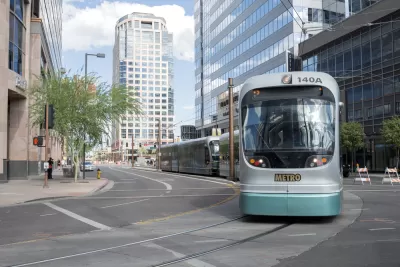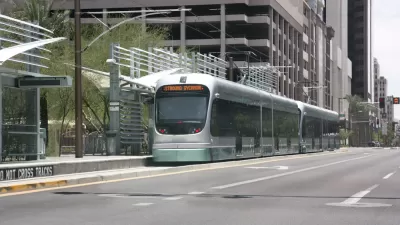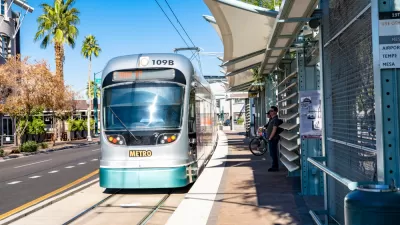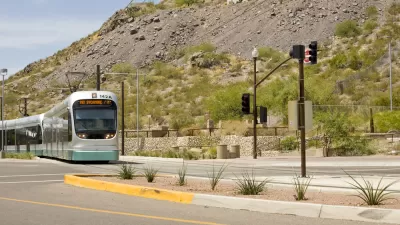Voters in Phoenix are already casting ballots in an election to be decided next week. Proposition 105 would end planned light extensions, and Proposition 106 would cap city spending.

Jessica Boehm explains the two ballot propositions under consideration in Phoenix with the potential to dramatically alter the planned course of the city.
The first proposition, Prop 105, is essentially an anti-transit bill. Somewhat confusingly, a yes vote on Prop 105 is a no vote on transit. "If voters approve Proposition 105, Phoenix must cancel all light-rail extensions and divert the city money it would have used to build them to other transportation projects, like street repairs or bus service," explains Boehm.
The voters of Phoenix have supported long-term transit planning, and funding, in the past. A yes vote on Prop 105 wouldn't end the sales tax that's generating the $31.5 billion to fund the projects in Phoenix's 35-year transportation plan, explains Boehm. Proposition 105 just ensures that money won't be spent on light rail.
Proposition 105 gained some notoriety this week when a Netflix show, Patriot Act with Hasan Minhaj, mentioned the involvement of the Koch brothers-funded Americans for Prosperity in the effort to get the proposition on the ballot.
Boehm's coverage includes information about the organizations and politicians supporting and opposing the proposition and details about how a yes vote would alter the direction of transportation planning in the city.
Boehm also explains the details of Proposition 106 in the same article. Prop 106 would limit spending, including funding for capital investment and maintenance. The cap would be assessed in relation to an annual assessment of the city's pension liabilities. Currently, 10 percent of the city's budget is devoted to paying its pension debt.
"Proposition 106 would require the city to pay more each year, with the goal of paying off the debt sooner. That will require the city to cap its spending on other city services, such as libraries or park programs," according to Boehm.
FULL STORY: Phoenix election: What you need to know about Proposition 105 and Proposition 106

Planetizen Federal Action Tracker
A weekly monitor of how Trump’s orders and actions are impacting planners and planning in America.

San Francisco's School District Spent $105M To Build Affordable Housing for Teachers — And That's Just the Beginning
SFUSD joins a growing list of school districts using their land holdings to address housing affordability challenges faced by their own employees.

The Tiny, Adorable $7,000 Car Turning Japan Onto EVs
The single seat Mibot charges from a regular plug as quickly as an iPad, and is about half the price of an average EV.

Seattle's Plan for Adopting Driverless Cars
Equity, safety, accessibility and affordability are front of mind as the city prepares for robotaxis and other autonomous vehicles.

As Trump Phases Out FEMA, Is It Time to Flee the Floodplains?
With less federal funding available for disaster relief efforts, the need to relocate at-risk communities is more urgent than ever.

With Protected Lanes, 460% More People Commute by Bike
For those needing more ammo, more data proving what we already knew is here.
Urban Design for Planners 1: Software Tools
This six-course series explores essential urban design concepts using open source software and equips planners with the tools they need to participate fully in the urban design process.
Planning for Universal Design
Learn the tools for implementing Universal Design in planning regulations.
Smith Gee Studio
City of Charlotte
City of Camden Redevelopment Agency
City of Astoria
Transportation Research & Education Center (TREC) at Portland State University
US High Speed Rail Association
City of Camden Redevelopment Agency
Municipality of Princeton (NJ)





























